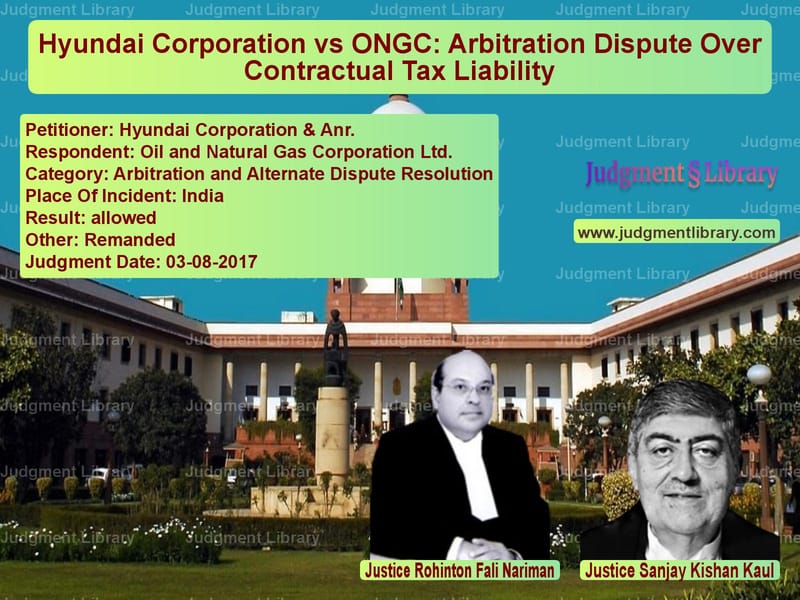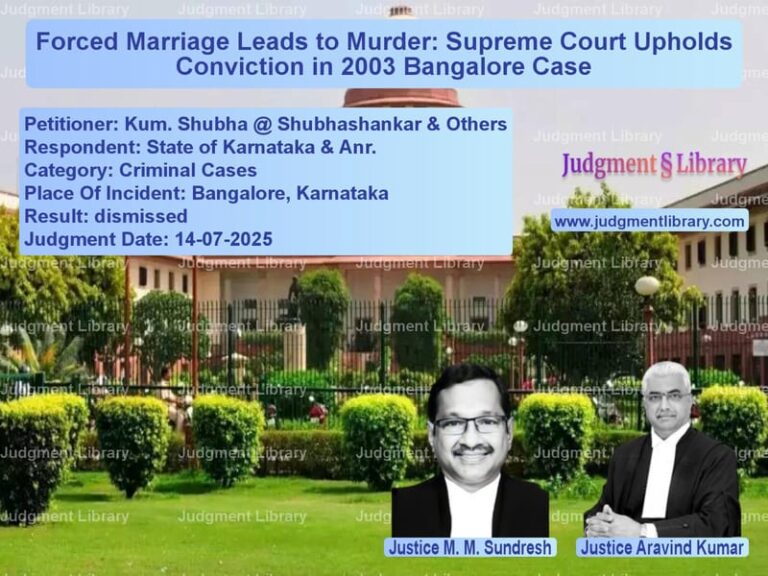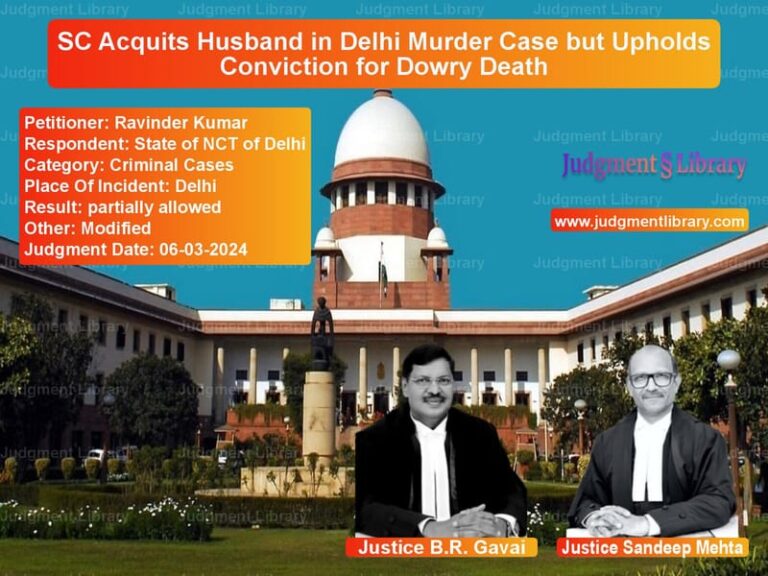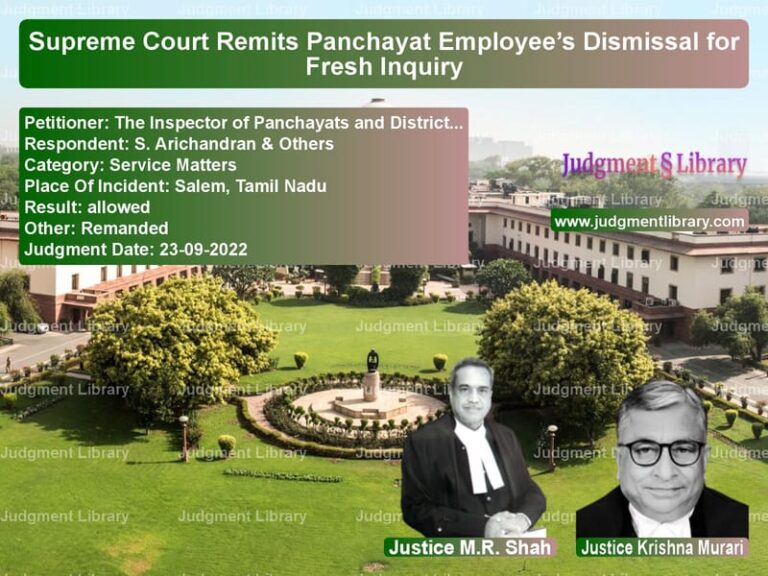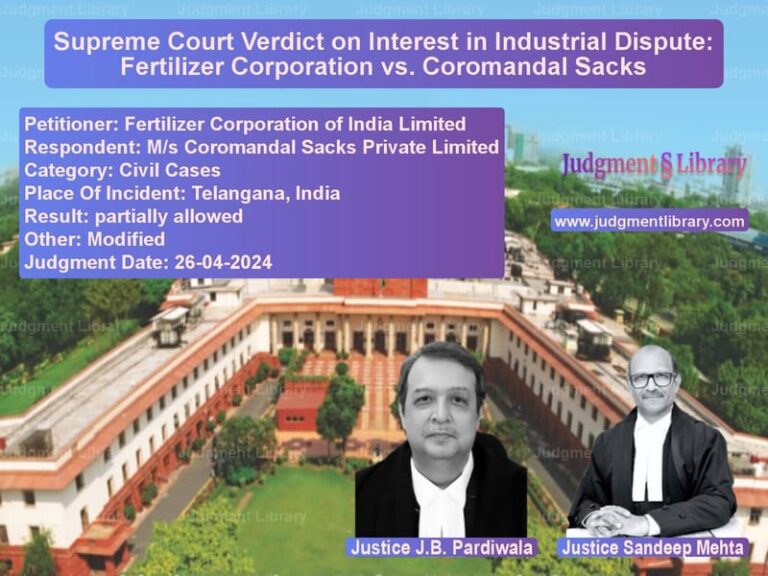Hyundai Corporation vs ONGC: Arbitration Dispute Over Contractual Tax Liability
The case of Hyundai Corporation & Anr. vs. Oil and Natural Gas Corporation Ltd. (ONGC) is a significant ruling by the Supreme Court of India concerning an arbitration dispute regarding tax liabilities under a contract for offshore oil exploration. The primary issue revolved around whether ONGC was liable to reimburse Hyundai for additional tax burdens imposed due to a retrospective change in Indian tax laws. The Court ruled in favor of Hyundai, remitting the matter to a new arbitrator for fresh consideration.
The ruling underscores the importance of clear contractual provisions concerning changes in law and the obligations of contracting parties in high-value infrastructure and exploration projects.
Background of the Case
In October 1982, ONGC floated a tender for two offshore platform facilities for oil exploration and drilling. Hyundai Corporation, the appellant, submitted two tenders on January 13, 1983, and March 22, 1983. ONGC accepted these tenders, and formal contracts were signed on December 16, 1983.
Shortly after, on March 31, 1983, the Government of India issued a notification extending the Income Tax Act, 1961, to the Continental Shelf and Exclusive Economic Zone of India. This became effective from April 1, 1983, meaning that companies engaged in offshore oil exploration were now subject to Indian income tax.
Hyundai subsequently subcontracted a portion of the work to M/s McDermott International Inc., Panama, which resulted in additional tax liabilities under the newly extended tax provisions. These new tax liabilities led to a contractual dispute between Hyundai and ONGC regarding which party was responsible for bearing these costs.
Key Legal Issues
- Whether ONGC was liable to reimburse Hyundai for tax payments under the contract’s Change of Law Clause (Clause 17.3).
- Whether the contract’s Payment Obligations Clause (Clause 13.2.8) exempted ONGC from reimbursing Hyundai for such tax liabilities.
- Whether the arbitral award correctly interpreted the contract in favor of ONGC.
- Whether the Umpire exceeded his jurisdiction by deciding an issue not originally referred to him.
Arguments by the Petitioner (Hyundai Corporation)
Hyundai Corporation, through its legal counsel, argued that:
- The Change of Law Clause (Clause 17.3) explicitly stated that if there were any new taxes imposed after the contract date, ONGC was obligated to indemnify Hyundai.
- The Indian Income Tax Act was extended to the Continental Shelf and Exclusive Economic Zone after Hyundai had submitted its tender, thus qualifying as a ‘change in law.’
- The subcontractor, McDermott International, had to pay additional taxes under Section 44BB of the Income Tax Act, which was retrospectively applied from April 1, 1983.
- Hyundai was forced to reimburse McDermott International for these taxes and thus ONGC should indemnify Hyundai under Clause 17.3.
- The arbitral award, which ruled against Hyundai, wrongly interpreted the contract and ignored the impact of Clause 17.3.
Arguments by the Respondent (ONGC)
ONGC countered with the following arguments:
- The contract’s Payment Obligations Clause (Clause 13.2.8) explicitly stated that ONGC was not responsible for payments to subcontractors.
- The extension of the Income Tax Act was not a new tax imposition but merely an extension of an existing law.
- Hyundai had entered into a separate agreement with McDermott International and should have factored tax implications into their contract.
- The arbitral award correctly interpreted the contract by holding that Hyundai’s claim was barred under Clause 13.2.8.
Supreme Court’s Judgment
The Supreme Court, in a judgment delivered by Justice Rohinton Fali Nariman and Justice Sanjay Kishan Kaul, ruled in favor of Hyundai Corporation and set aside the arbitral award.
1. Clause 17.3 (Change of Law) Prevails Over Clause 13.2.8
The Court ruled that Clause 17.3 specifically dealt with changes in law, which meant that ONGC was liable to indemnify Hyundai for any increased costs due to new tax laws:
“Clause 17.3 was inserted at Hyundai’s request, indicating that it was intended to cover increased costs arising from changes in tax laws. It was a specific clause that should override Clause 13.2.8, which had a more general scope.”
2. Arbitrator’s Misinterpretation
The Court found that the arbitrator had misinterpreted Clause 17.3 and failed to consider its full effect:
“The learned Arbitrator did not consider the retrospective application of tax laws, which resulted in additional financial burdens for Hyundai.”
3. Umpire’s Award on an Unreferred Issue
The Supreme Court noted that the arbitrator, instead of deciding the limited issue referred to him, ruled on whether tax was payable under Section 44BB, which was not in dispute:
“The award was rendered on an issue never referred to the Umpire. This amounts to exceeding jurisdiction, rendering the award liable for setting aside.”
4. Appointment of a New Arbitrator
The Court, acknowledging the age of the case, remitted the matter to a new arbitrator:
“With the consent of both parties, we appoint Justice Aftab Alam as the new Umpire to decide the limited issue of whether Clause 13.2.8 overrides Clause 17.3.”
Key Takeaways from the Judgment
- Specific contractual provisions take precedence over general ones: Clause 17.3, dealing specifically with changes in law, prevails over Clause 13.2.8.
- Retrospective application of tax laws can trigger contractual indemnities: Companies affected by new taxes may seek compensation under change-in-law provisions.
- Arbitrators must rule within their jurisdiction: Decisions on issues not referred to them can be set aside.
- Long-pending disputes can be remitted to new arbitrators: To ensure fair adjudication, courts may appoint new arbitrators when necessary.
Impact of the Judgment
This ruling has significant implications for commercial contracts and arbitration in India:
- Companies engaged in large-scale projects must carefully draft change-in-law clauses to protect against tax burdens.
- Arbitrators must ensure they rule only on referred issues.
- Future contracts with government entities should explicitly address indemnities related to retrospective tax applications.
Conclusion
The Supreme Court’s ruling in Hyundai Corporation vs. ONGC reinforces the importance of clear contractual terms and upholding arbitration principles. By setting aside the arbitral award and appointing a new arbitrator, the Court ensured a fair resolution of the dispute while affirming that ONGC could not escape liability for retrospective tax burdens imposed on Hyundai.
This decision serves as a precedent for interpreting change-in-law clauses in high-value contracts, ensuring that contracting parties honor their obligations fairly and transparently.
Don’t miss out on the full details! Download the complete judgment in PDF format below and gain valuable insights instantly!
Download Judgment: Hyundai Corporation vs Oil and Natural Gas Supreme Court of India Judgment Dated 03-08-2017.pdf
Direct Downlaod Judgment: Direct downlaod this Judgment
See all petitions in Arbitration Awards
See all petitions in Contract Disputes
See all petitions in Enforcement of Awards
See all petitions in Judgment by Rohinton Fali Nariman
See all petitions in Judgment by Sanjay Kishan Kaul
See all petitions in allowed
See all petitions in Remanded
See all petitions in supreme court of India judgments August 2017
See all petitions in 2017 judgments
See all posts in Arbitration and Alternate Dispute Resolution Category
See all allowed petitions in Arbitration and Alternate Dispute Resolution Category
See all Dismissed petitions in Arbitration and Alternate Dispute Resolution Category
See all partially allowed petitions in Arbitration and Alternate Dispute Resolution Category

